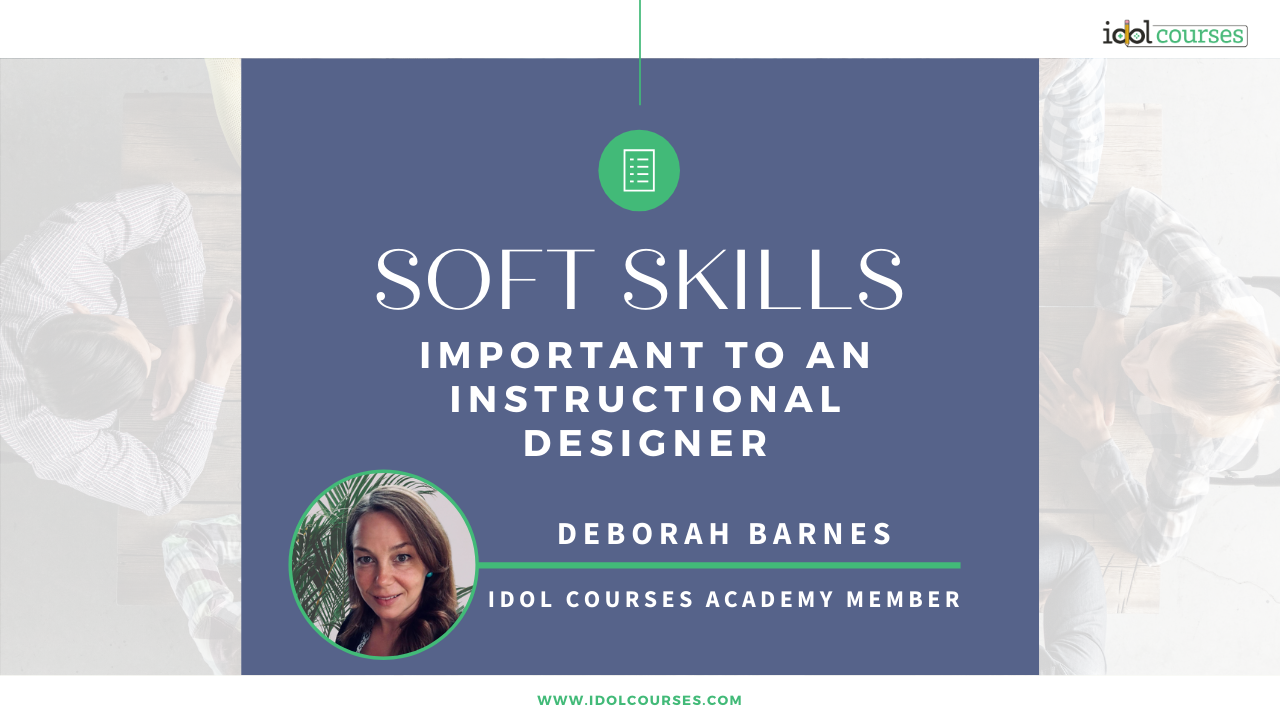Soft Skills: Important to an Instructional Designer
Jan 31, 2021
Soft skills, which can also be called emotional intelligence (EQ), are important to instructional designers because even though we may feel as though we are in a silo, we actually work with various people across different departments. Instructional designers are constantly collaborating, giving or getting feedback, checking in with stakeholders, and communicating a message. This means a level of comfort and skill is required when interacting and working with others.
Here are my top 3 soft skills important to the instructional designer role.
Empathy
One reason why educators make great instructional designers is because they are empathic. In fact, the first step an educator takes when teaching a class is to fully understand where their students are. An instructional designer is not any different. Knowing where the learners are starting from and understanding their struggles to achieve certain goals begins the process of bridging a gap. When learners feel frustrated with a certain process, the instructional designer can find ways to address the challenges and improve the overall experience. In fact, for many instructional designers, empathizing with learners and finding practical solutions is one of the most rewarding aspects of their job.
Teamwork
The essence of an instructional designer’s role is to collaborate and work with various team members in order to efficiently build out a rock-star training program. Throughout this collaboration process, an instructional designer will need (once in a while) to flex or bend for the sake of the team. While consultants don’t have to be super flexible, corporate instructional designers often do. This is because they sometimes work with difficult stakeholders and SMEs or the project’s priorities shift from the original plan. Stakeholders can change their minds, SMEs can be stubborn and financial budgets can get tightened. Even though instructional designers have specific expertise, their skills and knowledge are not always fully understood and decisions are made despite their recommendations. Therefore, in order to move a project forward, an ID may have to compromise. This is a hard and frustrating place to be - I should know because I have been there many times. The truth is a project has many angles and a multitude of factors outside of the learning experience need to be considered. The instructional designer plays a key role, but projects are a team game. That’s why being a team player is an important quality; it shows you are flexible and solution-oriented
Problem-solving
When working as an instructional designer, it is almost guaranteed that you will come up against some problems because the day-to-day duties do not play out like a textbook. Technology breaks, misunderstandings happen and scheduled events don’t go as planned. These issues can halt training, affect how the course is delivered, and even compromise the success of a project roll-out. At times, people will look to the instructional designer for options or solutions. While the ID doesn’t have to solve every little piece of the problem, their input is highly valued and helpful. On the flip side, an instructional designer who doesn’t have any solutions to offer will be at the mercy of other decision-makers. These decisions play a critical role in the learning and development space, so finding creative ways and strategies to work around challenges will greatly benefit the instructional designer and contribute to their overall success.
We all know that mastering software, understanding learning methods and developing well-designed materials are key to an instructional designer’s success; however, soft skills are just as important. Employers certainly don’t overlook them, so neither should we. While there are numerous soft skills to mention, I think being empathetic while exhibiting teamwork and effective problem-solving are essential no matter what the ID task or role entails.
Written by: Deborah Barnes
Connect with Deborah on Instagram or LinkedIn.
Deborah is the founder of DB Learning Solutions, a consultant agency dedicated to helping new course creators design and develop online courses. Deborah is a former corporate instructional designer with more than 10 years of experience in the L&D field. She has a knack for needs analysis, organizing technical content, building learner engagement and infusing her easy-going nature into her work wherever possible. Although Deborah is new to the digital course industry, she is on a mission to elevate the quality of online courses, support the learner’s journey and improve the online learning experience for all.
Stay connected with news and updates!
Join our mailing list to receive the latest news and updates from our team.
Don't worry, your information will not be shared.
We hate SPAM. We will never sell your information, for any reason.


